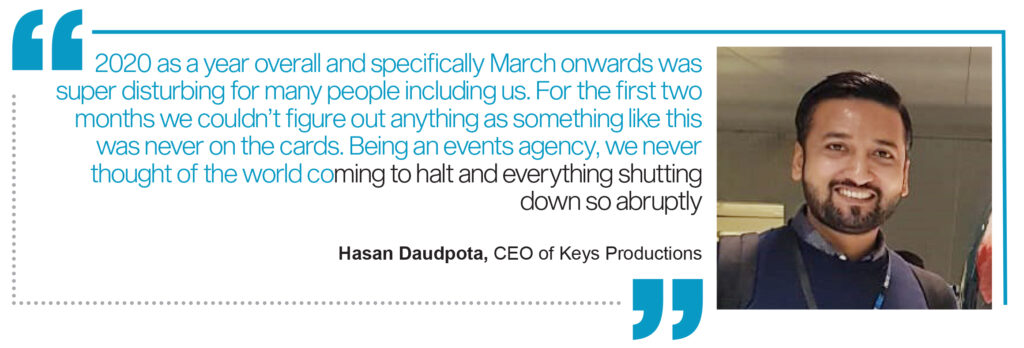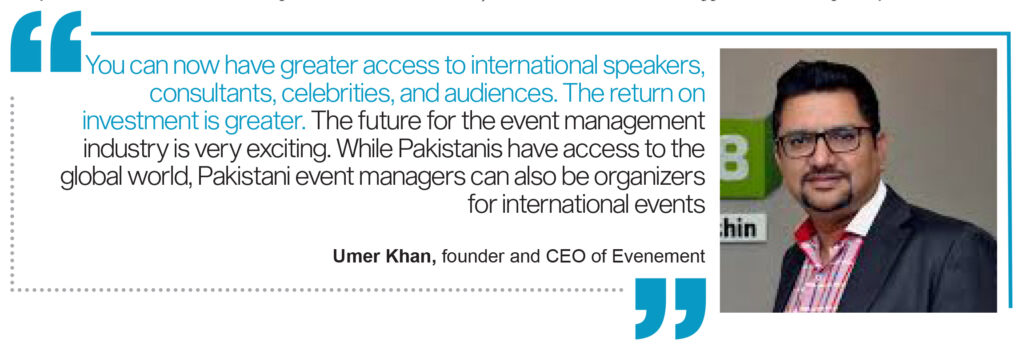The year 2020 was a year of cancelled plans and events. Pakistanis had even put a ban on weddings, something they take extremely seriously.
And yet one niche did very well: corporate event management companies. Turns out, Pakistan’s corporate sector returned to business as usual quite rapidly, which meant corporate events. Even though the year 2020 was devastating to society at large, and at least for the first few months there were no physical events, some event managers managed to end the year in positive. As Azfar Ahsan, CEO at the Nutshell Forum, an event management company said, “Despite all the hardship, we ended 2020 with greater sponsors than before and better gains.”
Exactly how did they achieve this? Profit takes a look.
First, the bad days
Before we talk about success, it is important to note that the initial days of the pandemic still hit most companies out of the blue.
Hasan Daudpota, CEO of Keys Productions explained, “2020 as a year overall and specifically March onwards was super disturbing for many people including us. For the first two months we couldn’t figure out anything as something like this was never on the cards. Being an events agency, we never thought of the world coming to halt and everything shutting down so abruptly.”
For Ahsan, the virus came at the absolute worst time. He was scheduled to host approximately 1000 delegates, including more than 175 foreign attendees and speakers, at the 4th edition of Leaders in Islamabad Forum during March.
“In February, the virus was not as serious in Pakistan as it was in the outside world. Despite that, our team took a timely decision to postpone the event keeping in mind global dynamics and the fact that the conference was to host global leaders. We tentatively rescheduled to organize the event in July. No one in their wildest thoughts would have assumed the virus and lockdowns would stretch out beyond that,” he said.
While the event could not take place in July, because the virus unfortunately extended its stay, Ahsan said that his team remained busy in organizing online dialogues, roundtables, and conferences. “We scheduled them at 9:30 PM regularly. This allowed people to watch and participate after they’re done with their days’ work and dinner.”

Ahsan said, “I know a lot of people that spent the lockdown phase planning and understanding dynamics. They decided to remain in business and wait for the devastating impact of the virus to go away. However, I also know people that went out of business or decided to do something else because the event management business had come to a standstill.”
How did these businesses start making money?
Pakistan is one of the few countries that opened up relatively quickly compared to others. The reason? Smart lockdowns implemented by the federal government. Pakistan was also lucky in that the number of cases and deaths were not as alarming as other countries. As a result, the corporate world went back to business as usual, which also meant a return to corporate events.
That is where the event management companies found business. In November 2020, Ahsan hosted The Future Summit. “In 2019, we hosted more than 1000 people. However, this year we hosted 300 people at the event. Despite that our reach was much bigger and we got 20% more sponsors than ever. I, however, did not increase my charges for the event compared to 2019. Despite that, the year ended on a positive note.”
For Ahsan, organizing the Future Summit was an accomplishment. He says that the event was organized at a time when very few events of such scale were happening anywhere in the world.
Keys Production was able to stay afloat due to its diversified services. “We have an independent PR department and an independent content department, which worked hard to make sure the work kept coming. In fact, the workload on the PR, production and design side increased a lot and made us survive 2020 well, and we ended the year on a very good note,” notes Daudpota.
Hybrid events
Another key factor for many event management companies was to hold ‘hybrid’ events, also called ‘phygital’ events. These are events that are both attended physically in person, and virtually online.
“Keys Productions is one of the very few agencies in Pakistan that disrupts on a regular basis, we are an agency that questions its own success formulas by believing in Kaizen every single day,” said Daudpota [Kaizen is a Japanese term which means ‘continuous improvement’.]
He went on to explain: “The very first step was to move properly on the virtual and hybrid events size, as we have always been extraordinary on the technical production side, be it creative set designs, quality broadcast, flawless executions, safety management and much more. We executed more than 20 virtual and hybrid Events in 2020 only, and so far we have done three similar projects in 2021 as well,” said Daudpota.

He also said the most difficult task while organizing events during the pandemic was to obtain no objection certificates, or NOCs, and approvals. “During Covid-19 especially, our biggest concern for each production or query was NOCs and permissions. It is hard to explain to clients that it is costing us and even a postponement costs us a lot, but there are always 100 other agencies in the line who are ready to do anything to score that same client, so things become challenging at times. But we are so used to the hustle now,” he said.
Once permission is out of the way, then the agency must solve for execution – particularly in managing the digital element. Daudpota said, “For equipment, we already had our production tech suppliers. For broadcast, we partnered with internet service providers for dedicated internet connections and used our broadcast software. For platforms and integrations, we invested in multiple platforms, bought corporate connections mostly ranging from $500 to $5,000, and more at times, depending on the magnitude of the project and client requirements.”
Ahsan explained that his business had already been in practice of using streamyard for live streaming broadcast quality event coverage on Facebook live and YouTube in order to reach a greater number of people.
“Our sponsors were happy with the fact that their logo placement was not only present physically at the event, but also displayed throughout our online stream. It gave them a brand presence,” explained Ahsan.
Why were digital events not common before the pandemic?
According to Hashmi, “There was very little acceptance for online or virtual events, or virtual speeches prior to Covid-19. Sponsors and participants did not seem too keen. However, when the world came to a stand still and there was no other alternative, people realized what could be gained.”
He adds that prior to the pandemic, individuals would disrupt their whole schedule to fly out to different cities for a short speech or session, when in reality, the same impactful speech or session could have been done virtually.
Another reason why attendees and sponsors seemed hesitant to accept digital aspects in events was because of the lack of infrastructure.
Should virtual events be cheaper?
Corporate events in Pakistan, just like in much of the rest of the world, are expensive affairs. Often hosted in a city’s most expensive hotels, events consist of expensive food, travel and lodging arrangements, large teams, and fancy equipment. One would assume that entirely digital events would be drastically cheaper, whereas hybrid events would also be a form of saving money.
That, however, is not always the case.
Hashmi said, “Digital events should not be seen as a way to cut down on costs. While organizers and sponsors may not have to pay for expensive business class flights, visas, and hotel stays, they still have to heavily invest in various technological aspects for a successful event. The same goes for hybrid events.”

“Even prior to Covid-19, the industry faced many challenges like having no companies doing event insurance whereas it’s pretty common in so many other countries. clients in Pakistan don’t focus much on safety management. Even if they do (on paper), they are not willing to pay any extra amount to ensure safety at the event, that creates challenges, especially under extraordinary circumstances like Covid-19,” Daudpota explained.
He went on to say: “Half of our clients in Pakistan are multinational companies, and they were already familiar with virtual events, but still they were completely clueless about the planning time, execution details etc, so it was a learning experience for them as well. The hardest part was convincing clients on budgets, as they were also taking quotes from agencies who are not as experienced as we are and they were quoting [a lower budget]. It’s really hard to convince any client that the budget we are charging is actually good for your event and your brand image and you should not be compromising on it.”
What came as a surprise is the fact that with hybrid events, not only do the organizers and event managers have to spend on the physical layout of the event, but also need to invest heavily in various digital event platforms.
Convincing clients about higher charges for hybrid events could sometimes be a challenge. Daudpota explains, “Reaction to costs vary client to client. We have clients who never question our cost structures and appreciate our transparency, even when the numbers cross several dozen millions. We also have clients who question us on every tiny miny amount. We follow the same cost structure for each and every client, and we always share breakdowns and details, which save our time of explanations and confusions. Most of our clients know the quality standard that we follow, so it was not too difficult to convince them on our budgets, as they have already seen our quality at their previous on ground events.”
There are also significant additional costs associated with hybrid events. “The most difficult part was to get the internet connection costs approved, as on average we charge around Rs250,000 to Rs300,000 for primary and secondary internet connections combined for main and backup connection for broadcast, as dedicated and uninterrupted internet connection is a must for a live broadcast.”
Ahsan added that while Nutshell Conferences uses Streamyard for now, the future requires more modern platforms. “The starting price for a good platform could be approximately $20,000. There is no upper limit to this,” he said. According to him, investing in platforms is the future, and there is no survival without it.
How are digital platforms acting as game changers?
According to Daudpota, “We started off with giving extreme comfort to our clients by doing their virtual and hybrid sessions at their own offices, by providing them creative sets, customized lights and also provided them with our virtual branding and broadcasting platforms from our partners in the US. Keys Productions is the first company in Pakistan who provided these solutions to local clients here. With our own platforms, we don’t need to use platforms like Zoom or Teams, and our platforms are way more secure and provide us complete freedom of branding and customization. We did a lot of integrations on virtual and hybrid sessions like doing online games for 500 people, online polls, online quiz, and online learning. We also provided virtual breakout rooms for the breakout sessions with complete automation.”

This is reminiscent of events held earlier last year. Consider last year’s technology conference 021 Disrupt, organized by The Nest I/O. The event was conducted digitally, but the organizers created a stage and held it on Hoppin rather than just live streaming it over Zoom or YouTube. As a result, attendees, whilst at the comfort of their homes or offices could engage, interact and network despite not being there in person.
For that very reason, Umer Khan, founder and CEO of Evenement also uses Hoppin for events. For Khan, Hoppin is a platform for digital events that can also be used for hybrid events. “There are various alternatives, some made in the US, India, Singapore, etc. As far as replicating the platform is concerned, that does not make much sense,” he said.
Hamza Hashmi, CEO of TerraBiz, and another user of Hoppin, felt that not only do event managers have to make sure the on ground experience is great, but also have to provide the right environment for virtual attendees and delegates. “People attend events with two purposes in mind, to learn and network. While one can learn online, networking remains a challenge. However, with the right platforms that can be done. Unfortunately we have to move beyond using live streaming features on social media sites and find creative ways to provide the right experience,” he said.
The future of the event industry
When asked about how he sees the industry post the pandemic, Khan said, “I see a surge in events. A lot of corporations are holding back on events. As soon as the situation allows for it, they will push for physical events.”
He added: “It would be a sweeping statement to say that hybrid events are definitely the future but any forward thinking entity or individual will always look into it. However, in the medium to long term, one question will stay. We will always question whether a task or event has to be done physically or can be done digitally.”
All four interviewed, however, agreed that as a result of hybrid events, the world is now accessible. According to Khan, “You can now have greater access to international speakers, consultants, celebrities, and audiences. The return on investment is greater.” In addition, he said, “The future for the event management industry is very exciting. While Pakistanis have access to the global world, Pakistani event managers can also be organizers for international events.”
Hashmi felt there will be a lot more investment in technology, along with the creation of jobs. Like Khan he also said that local Pakistanis may find work at international events due to the nature of the digital world.
For Khan, the possibilities were endless. He believed that public events and expos could now be undertaken virtually whilst maintaining contact, engagement and interaction. He also felt that the government could also jump the bandwagon, with regards to its policy making and outreach. Currently, the federal government tends to broadcast its decisions and policies on television.
Daudpota said that digital avenues were being explored even before the pandemic hit, but the way Pakistanis have responded to the rapid integration of technology seems promising. “We in fact had our platform introduced in Pakistan for virtual events, even before the pandemic happened. We strongly believe that virtual events would be saving a lot of time, energy, money and hassle. However, it will take time in a country like Pakistan where people believe in physical meetings and look for avenues for the same. The way we saw Pakistan in the last one year, running parallel with the world, I strongly believe that Pakistan will improve and disrupt further on the virtual world.”








